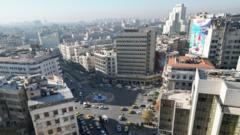**In a bid to support a peaceful transition in Syria, Antony Blinken seeks collaboration among regional powers during his visit to Jordan and Turkey.**
**Blinken Urges Regional Cohesion for Syria's New Governance**

**Blinken Urges Regional Cohesion for Syria's New Governance**
**U.S. Secretary of State emphasizes the importance of unity among nations in response to recent governmental changes in Syria.**
U.S. Secretary of State Antony J. Blinken concluded his visit to Jordan on Thursday, focusing on galvanizing support for a peaceful transition to a new Syrian government following the recent demise of the Assad regime. Speaking at a press conference in Aqaba post meetings with King Abdullah II and Foreign Minister Ayman Safadi, Blinken highlighted the dual nature of the current situation in Syria, describing it as a period of both promise and peril.
“Our goal is to ensure that the new Syrian leadership adheres to fundamental human rights principles, safeguards minority groups, and prevents the country from being exploited as a hub for terrorist activities, particularly by organizations like the Islamic State,” he stated.
Critically, the alliance responsible for President Bashar al-Assad’s ousting is spearheaded by Hayat Tahrir al-Sham (HTS), a Sunni Islamist faction previously linked to Al-Qaeda, which is designated as a terrorist entity by both the U.S. and various international bodies. Although HTS has shown indications of moderating its governance approach, pledging to cooperate with various sects, the true nature of its operational ethos remains uncertain.
Before heading to Ankara, Turkey, Blinken addressed concerns about Austin Tice, a freelance journalist long believed to be held captive in Syria, affirming, “Our efforts to locate him and facilitate his return continue relentlessly.”
In Ankara, he is slated to confer with President Recep Tayyip Erdogan and Foreign Minister Hakan Fidan. Blinken expressed apprehension regarding Turkey's renewed offensives against Kurdish forces in northeastern Syria, underlining the critical need to avoid igniting further conflicts in the already volatile region.



















